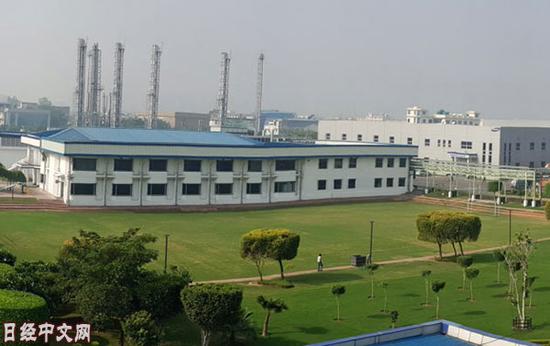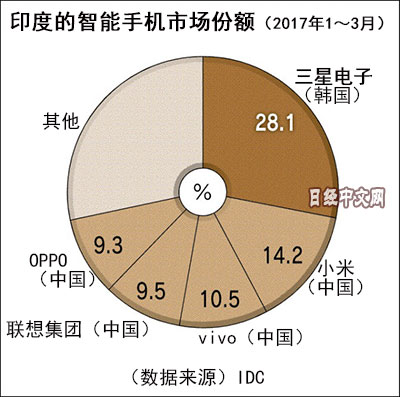South Korea's Samsung Electronics will increase the production capacity of mobile phones and refrigerators in Indian factories to twice the current level. The company will invest about 700 billion won (approximately 4.265 billion yuan), and will first increase its monthly production capacity of mobile phones to 10 million units and refrigerator capacity to 200,000 units in 2018. The Indian economy is growing at a faster rate than China. With the addition of Hyundai Motor Group, which has already established a new factory, the attitude of South Korean companies in respect of India has become clear.
Samsung faces headwinds in China, investing heavily in India

Samsung's factory in northern India, Uttar Pradesh
Samsung decided to increase its production capacity at its factory in Uttar Pradesh, northern India. The factory floor area will be expanded from the current 120,000 square meters to 240,000 square meters and additional production lines will be added.
Currently, the factory has a monthly capacity of 5 million handsets, including smart phones, and a refrigerator capacity of 100,000 units. India’s real gross domestic product (GDP) growth rate in 2016 reached 7.1%, which was higher than China's full-year growth rate for three consecutive years. In order to win demand for mobile phones and home appliances, Samsung will expand its production base and hope to achieve further growth.
For Samsung's smart phone business, the Indian market is an important base for the future. According to the US investigation company IDC, Samsung’s smartphone market share in India from January to March 2017 reached 28.1%, ranking first. However, due to the impact of the Chinese mobile phone company's offensive, it is considered that sales growth is weak.

In the Indian market, from the advanced model represented by the flagship model "Galaxy S8" to the low-priced model "Samsung Z4" equipped with an autonomous operating system (OS), Samsung has introduced a wide range of new products. Consolidate the top spot in sales.
Cole, who lives in New Delhi, spent 38,500 rupees (approximately RMB 4,068) 2 years ago and bought a Samsung Galaxy Alpha phone, which is still in use today. Kohl said that Samsung was chosen because "(Samsung) is the brand whose popularity is second only to the iPhone." Many of the young people in urban areas in India are like Cole: "If the budget cannot afford an iPhone, buy a Samsung."
In the mobile phone industry, there are views that India will surpass the United States as early as 2017 and become the world’s second-largest smartphone market after China. As a result of the fire accidents that occurred in 2016, consumer confidence in the quality of Samsung products has faltered, and sales competition with Apple and Chinese companies in the United States has also intensified. Under the background that China's market share has shrunk dramatically, if Samsung is caught in a disadvantage in India, it may lose the world's top spot.
Sales of the Samsung India business have not been disclosed, but it is expected to be around 800 billion yen in 2016. Among the overseas companies that have entered India, Maruti Suzuki ranks second only to the large-scale automobile company.
Samsung has been stationed in Uttar Pradesh, India since 1997. In addition, another plant was built in Tamil Nadu in the south in 2007 to produce air conditioners, televisions, and washing machines. Samsung is actively promoting local production in India at levels comparable to those of major overseas bases such as China and Vietnam.
Samsung’s deputy chairperson, Li Zaiyi, visited India in the fall of 2016 and met with Indian Prime Minister Modi. Although Li Zaiyu was subsequently sued for allegedly bribing former South Korean President Park Geun-hye, the Indian government still approved Samsung’s investment plan. Li Zaiyu’s gesture of showing high regard for India through “high-level diplomacy†is considered to be helpful. However, there are concerns that Li’s absence will have an impact on Samsung’s strategy formulation and implementation in the future.
